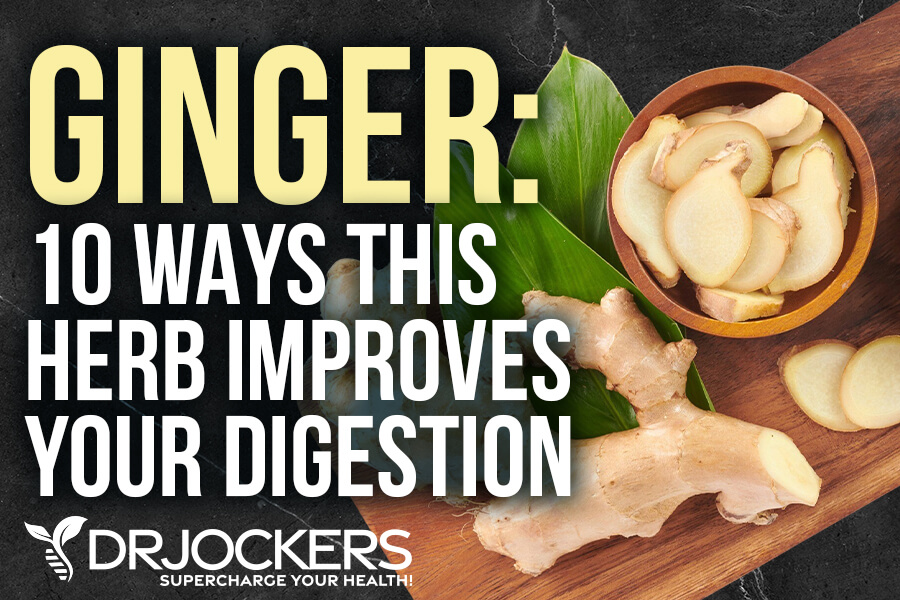
Ginger: 10 Ways This Herb Enhances Digestion
Ginger is one of my all-time favorite superfood herbs that I recommend to nearly every client I have ever worked with for its powerful ability to improve our digestive function and immune system. Superfoods such as ginger are foods and herbs that have a unique concentration of nutrients that synergize together to boost potential.
These foods are typically loaded with a combination of critical fatty acids, antioxidant phytonutrients, and essential amino acids. Ginger is a classic example of this as it has compounds with health benefits that go far beyond what can be studied at this time.
Ginger is used throughout the world in countries such as China, Japan, India, Greece, Caribbean countries, England, and the USA. It is made into teas, ginger ale, beers, bread, snap cookies and biscuits. Almost every culture has historically used it for its powerful ability to enhance immunity, improve digestion, and reduce inflammation.
This incredible superfood herb is 13th on the antioxidant list boasting an impressive ORAC score of 28,811. Ginger is composed of several volatile oils that give it its characteristic flavor and odor; zingerone, shogaols, paradols & gingerols.
These oils are powerful anti-bacterial, anti-viral, anti-fungal, and anti-parasitic agents (1). In addition, it inhibits cancer cell formation while firing up our body’s own inborn ability to destroy the cancer cells formerly present (2, 3, 4).
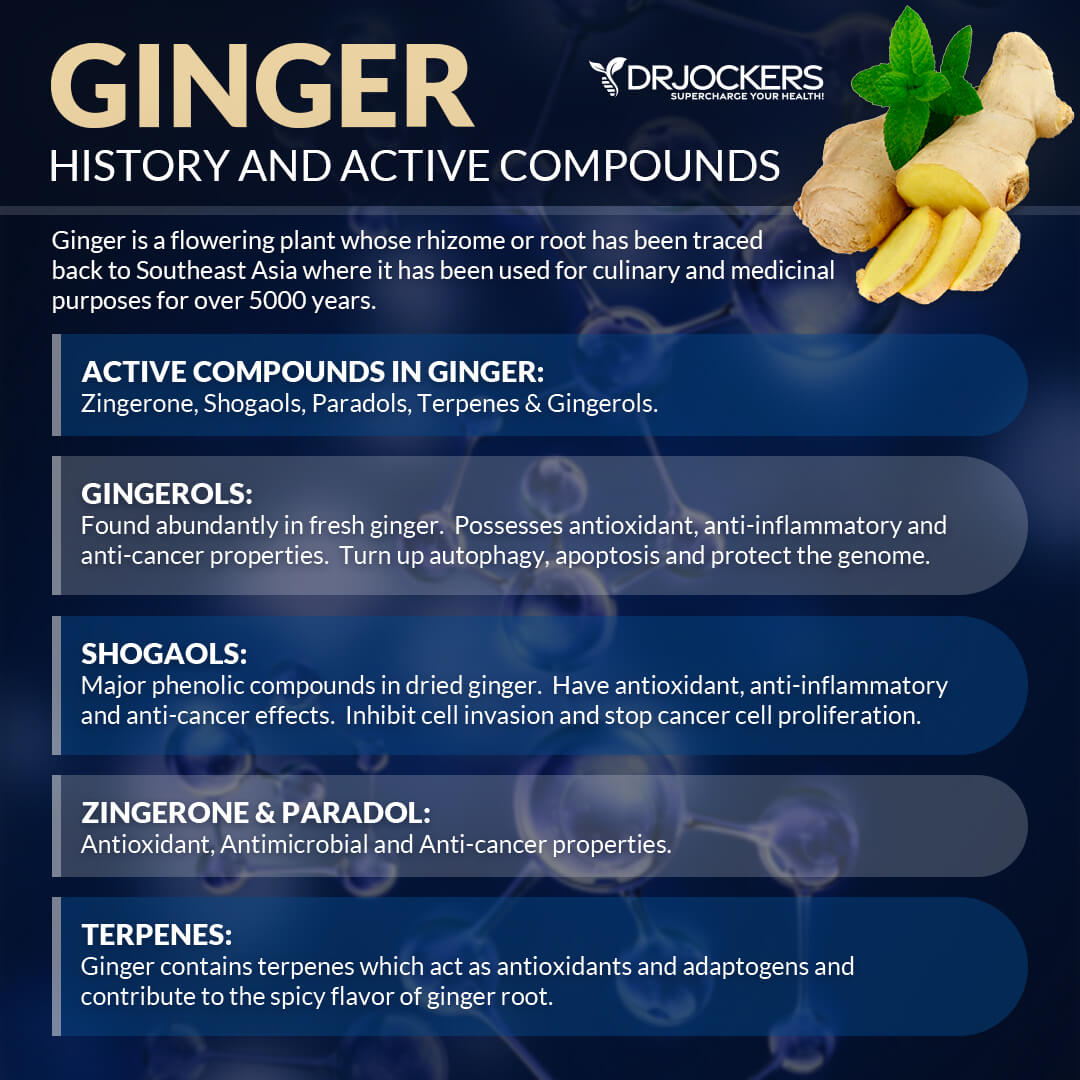
Ginger Improves Digestive Function
Ginger has classically been used to improve the digestion process. Nine different substances have been found that stimulate serotonin receptors in the gut which provides benefits to the gastrointestinal system. This reduces gut related inflammation and enhances nutrient absorption.
Ginger is classified as a carminative (reducing intestinal gas) and an intestinal spasmolytic (soothes the intestinal tract) while inducing gut motility. Ginger is known to reduce fever related nausea, motion sickness, and feelings of “morning sickness.” Additionally, it helps aid in the production of bile, making it particularly helpful in digesting fats (5, 6, 7).
If you are dealing with digestive challenges, I highly encourage trying out ginger in your diet and health routine. Using some ginger tea on a daily basis is a great way to begin. We also have a fantastic de-inflaming ginger-ale recipe at the bottom of this article.
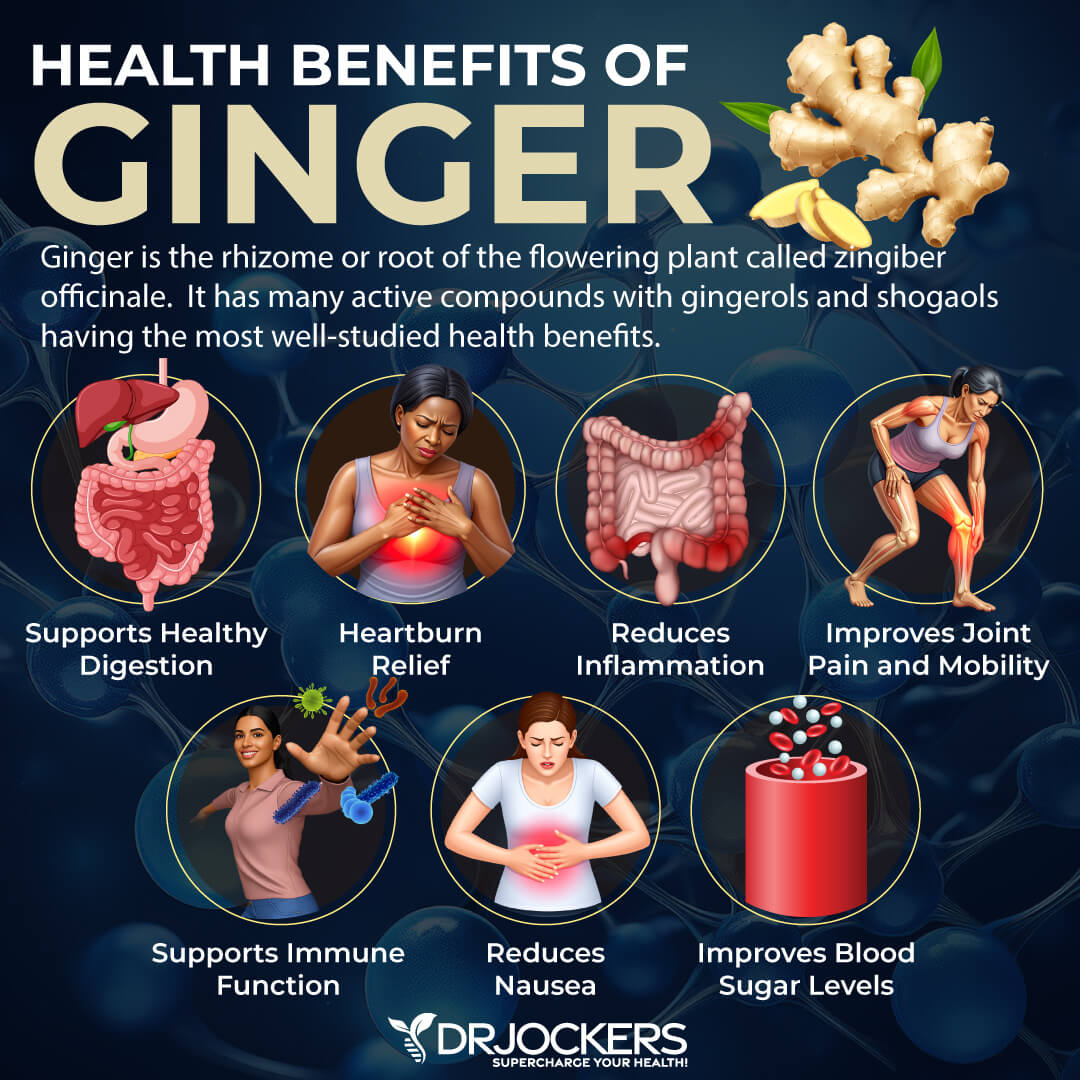
Ginger Provides Pain Relief:
Ginger is also an important part of a de-inflaming, natural pain-relief program. One compound called 6-gingerol has been shown to significantly inhibit the production of a highly reactive nitrogen molecule, nitric oxide, that quickly forms a dangerous free radical peroxynitrite (ONOO-).
Additionally, ginger helps to protect the body’s stores of glutathione (the super antioxidant and free radical destroyer) (8, 9). Due to its effect on glutathione and peroxynitrite, ginger has been shown to protect the brain and nervous system from degenerative stress (10).
Ginger is also very high in potassium which aids in electrical energy production and detoxification. It is a great source of manganese which protects the lining of the heart blood vessels and urinary tract. Ginger contains silicon which enhances skin, hair, teeth & nails. It helps assimilate calcium and reduces inflammation in the bone tissue aiding the development of strong bones and teeth.
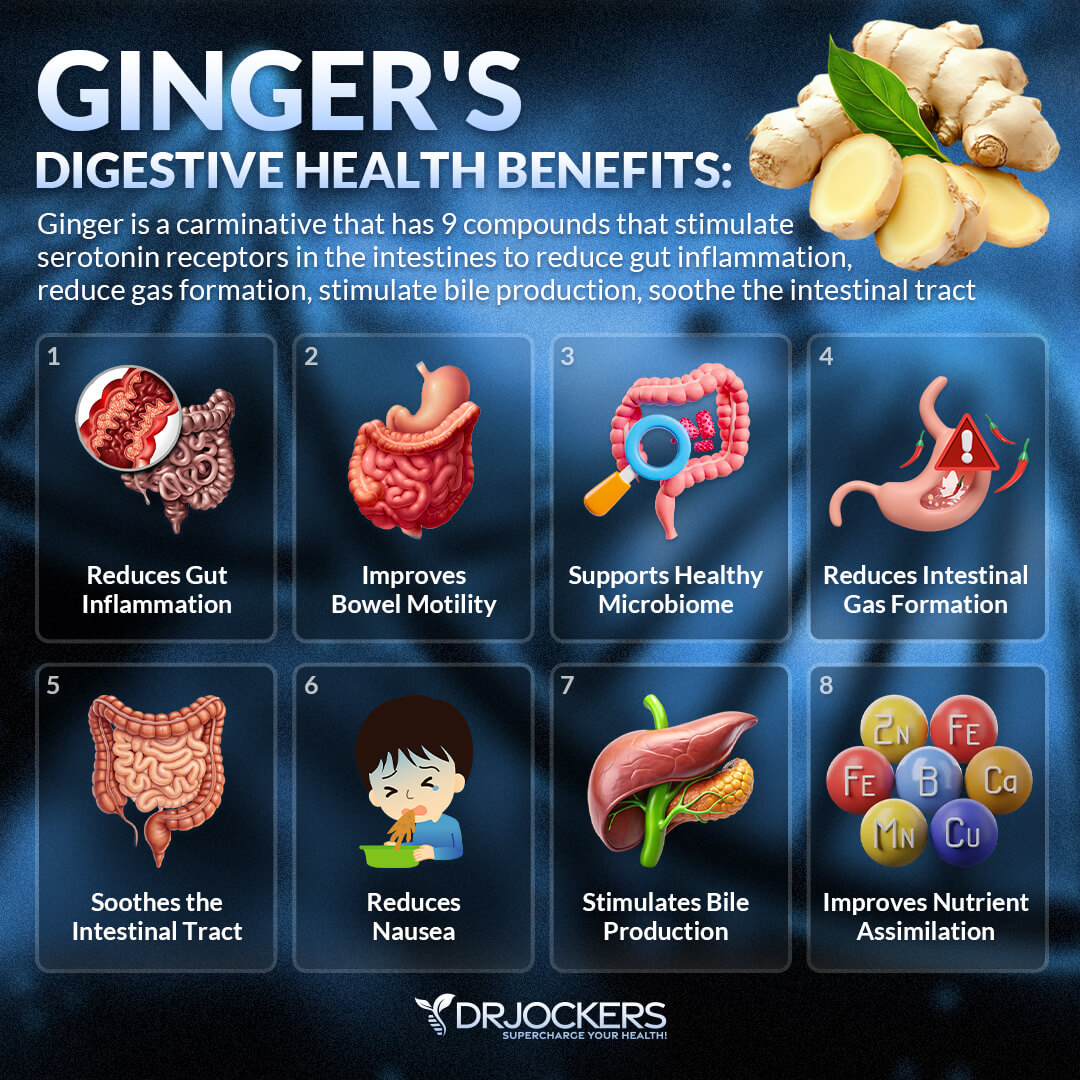
Functional Uses for Ginger:
Personally, ginger is something I recommend for a majority of my clients to use on a regular basis. This includes using ginger in teas and grating the fresh root on salads and meats and in green juices. Sometimes, I recommend supplementing with detox products that have this herb as it helps to aid in digestive function and liver detoxification.
Ginger helps stimulate digestive juices such as hydrochloric acid from the stomach and bile from the liver and gallbladder. This is why it is good to have ginger on or with your largest meals of the day. The Asian culture has used ginger in many of their dishes and you can even find pickled ginger in grocery store sushi packs.
I recommend grating fresh ginger on meat, salads, and stews. You can also use dry, powdered forms if you are unable to access fresh ginger. It is quite pungent so use it mildly and it will provide you with excellent health benefits.
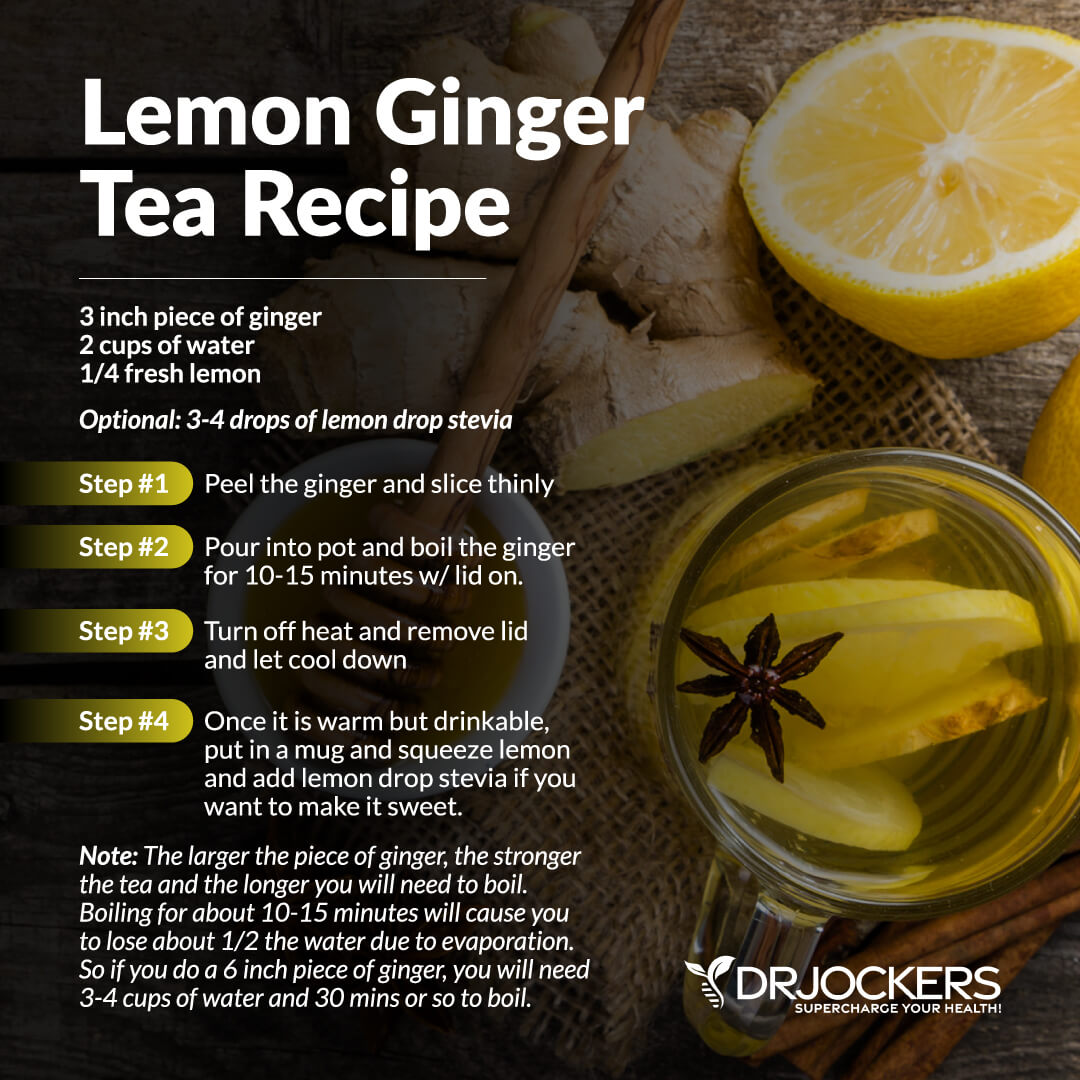
De-Inflaming Ginger Ale
The Europeans developed ginger ale many years ago and it was thought to be a health tonic that would benefit a wide variety of ailments. That is until the 20th century when it became highly processed and full of sugar and artificial flavorings.
Traditional ginger ale was simply fermented ginger tea. The fermentation process activates ginger’s full nutritional potential and it produces enzymes and probiotics for a powerful digestive health formula.
My de-inflaming ginger ale uses coconut water which is rich in electrolytes and low in fructose. The sugar in the coconut water provides the nourishment for good microbes to flourish. As they metabolize the sugar they produce B vitamins and organic acids that give the drink its natural effervescence and characteristic flavor. You should be able to find a coconut water kefir starter called Inner Eco at your local health food store.
2 Tbsp. of Coconut Water Kefir
1-2 cups of coconut water
2-4 oz. of fresh ginger grated
Combine all ingredients and let sit and ferment for 24 hours to provide an amazing, probiotic enriched soda alternative.
Supplemental Usage
Ginger has powerful anti-inflammatory and anti-microbial properties and is very effective in a blend of complementary supplements for a variety of health conditions. One of the key areas my team uses ginger for is to help the gut and reduce Candida and other opportunistic microbes such as H Pylori.
Our product Candida Elim features bioavailable along with oregano, turmeric, olive leaf, and caprylic acid. This is a fantastic product to support gut health and reshaping of the microbiome.
We also use ginger in combination with curcumin, Boswellia, rosemary extract, systemic enzymes, and bioflavonoids in our Inflam Defense. This combination of compounds is powerful for reducing inflammation in the body.
If you are dealing with chronic or acute pain conditions, degenerative joints, or have elevated inflammatory markers on your lab testing then I would highly recommend the Inflam Defense product.
If you want to work with a functional health coach, I recommend this article with tips on how to find a great coach. On our website, we offer long-distance functional health coaching programs. For further support with your health goals, just reach out—our fantastic coaches are here to support your journey.

Inflammation Crushing Ebundle
The Inflammation Crushing Ebundle is designed to help you improve your brain, liver, immune system and discover the healing strategies, foods and recipes to burn fat, reduce inflammation and Thrive in Life!
As a doctor of natural medicine, I have spent the past 20 years studying the best healing strategies and worked with hundreds of coaching clients, helping them overcome chronic health conditions and optimize their overall health.
In our Inflammation Crushing Ebundle, I have put together my very best strategies to reduce inflammation and optimize your healing potential. Take a look at what you will get inside these valuable guides below!
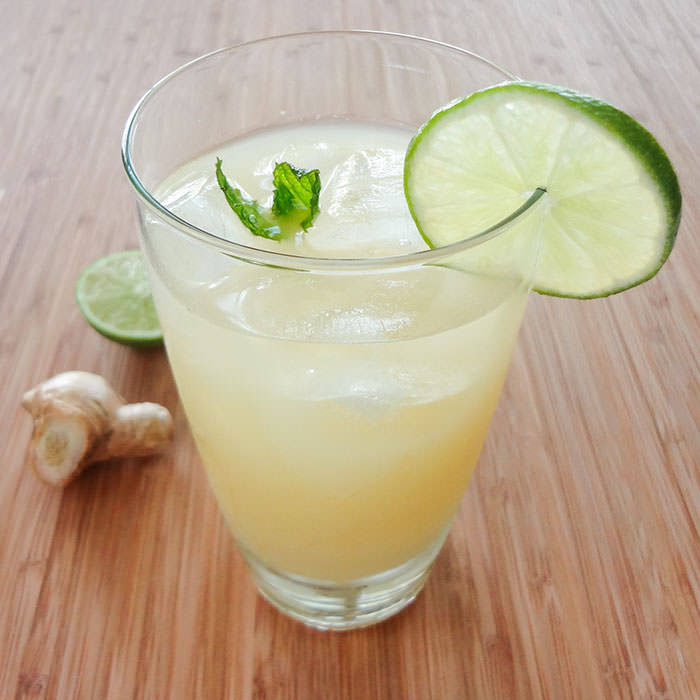





What about switchell?
It can be helpful Jean! Watch out for adding too much sugar though!
Does a store bought tea, like Bigelow or Republic of Tea in lemon ginger or ginger help?
Yes for sure!
How much ginger (in grams) is recommended for digestive health, per meal?
Hey Joshua, It can vary from person to person. I would recommend starting with a low dosage to see how well you tolerate it.
I love ginger, but a few years ago I developed sensitivity to it: I would get skin rush, upset stomach, and diarrhea after eating it. This lasted a few years and now I can ginger again but I don’t understand why my body reacted to it in this way. Any ideas?